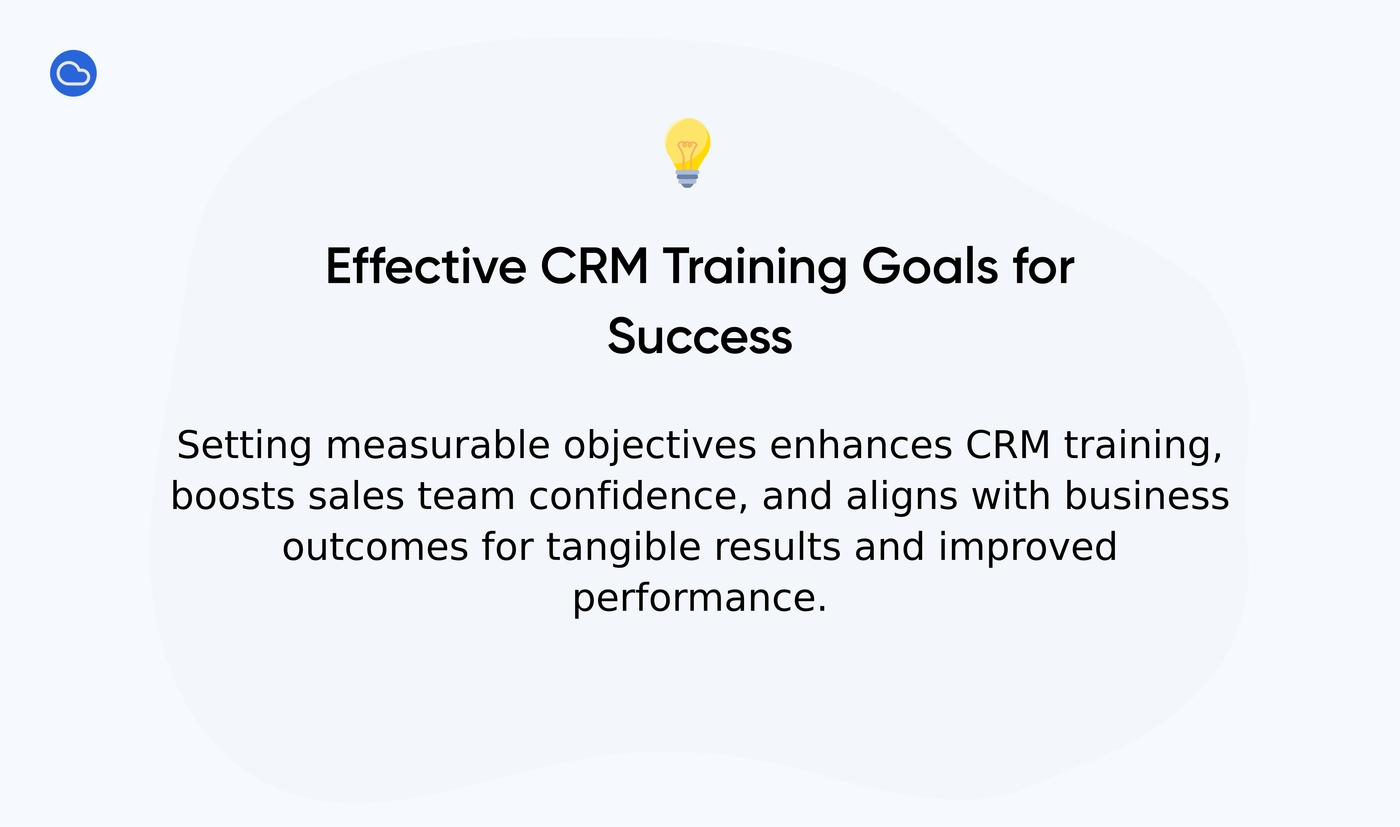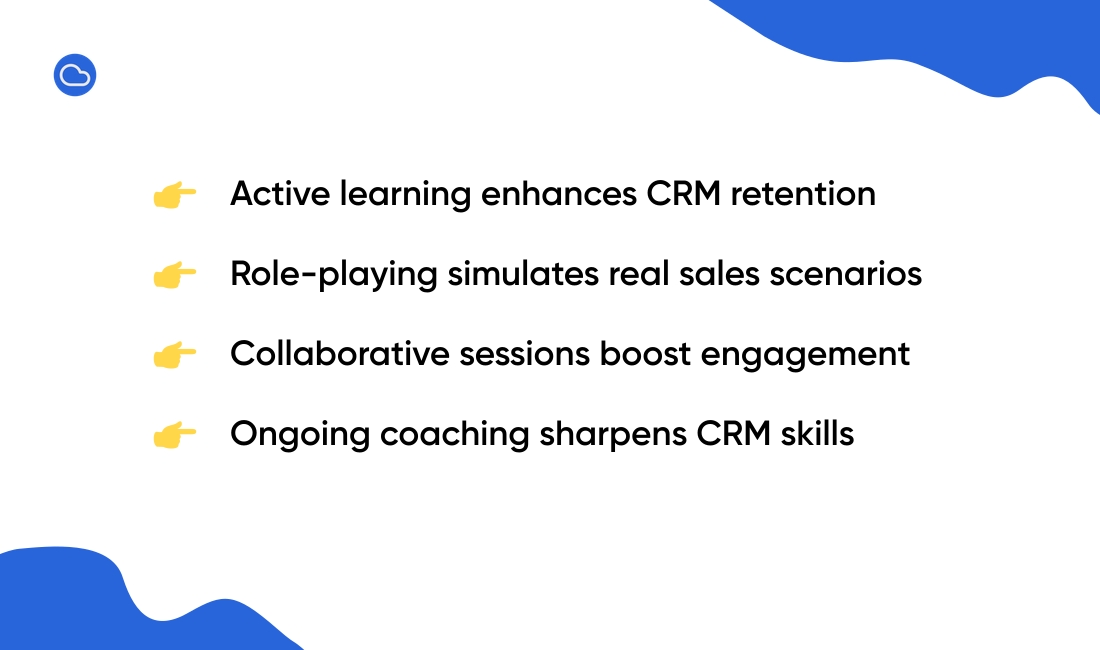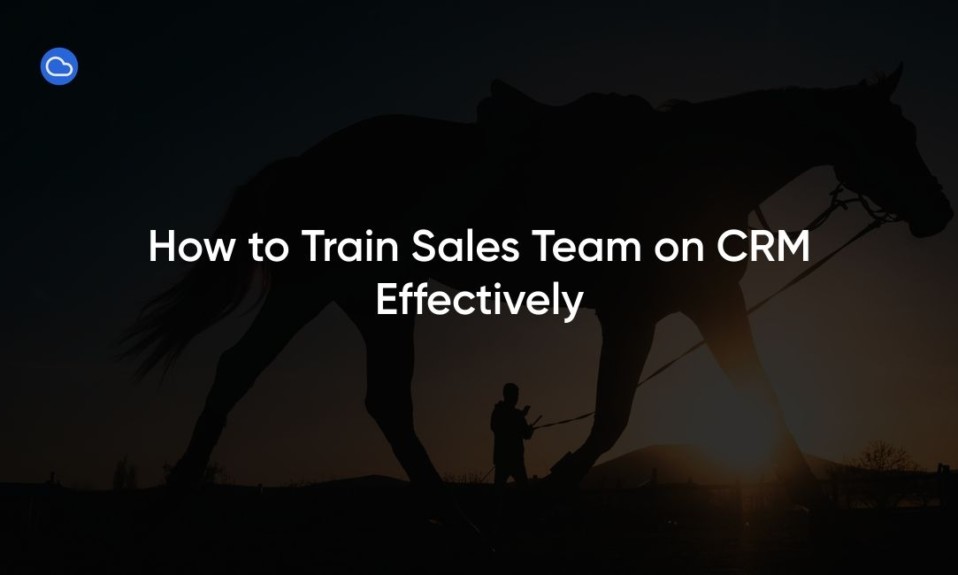Your sales team’s CRM isn’t just a tool – it’s either your greatest asset or your most expensive mistake.
Learning how to train sales teams on CRM effectively bridges the gap between software capabilities and actual revenue growth.
Without proper training, even top performers waste hours on data entry, miss critical follow-ups, and struggle to forecast accurately.
This guide reveals actionable strategies to build engaging training programs, drive consistent adoption, and measure ROI through improved deal velocity and customer insights.
Why CRM Training Is Essential for Sales Success
Benefits of CRM Training for Sales Teams
CRM training offers remarkable advantages for sales teams. Improved data accuracy stands out as a primary benefit. When your team understands how to input and manage data effectively, it leads to more reliable information.
Look, I’ve seen teams transform their decision-making processes with accurate CRM data – it’s like night and day! When everyone inputs information correctly, your strategies become more informed and impactful.
Streamlined workflows come next. Effective CRM usage simplifies processes, reducing time spent on administrative tasks. This shift allows your team to focus on what truly matters: building relationships with customers.
Better forecasting plays a crucial role too. With enhanced insights into customer behavior, sales teams can predict future needs and prepare accordingly. And let’s face it – who doesn’t want to be ahead of the curve?
-
More accurate sales predictions
-
Improved resource allocation
-
Better inventory management
-
Enhanced budget planning
Enhanced customer insights round out these benefits. CRM training enables deeper understanding of customer preferences and buying patterns. This knowledge empowers your team to tailor their approaches, fostering stronger connections.
How CRM Improves Sales Team Performance
Sales cycle efficiency dramatically improves with proper CRM implementation. When every team member has access to crucial client information in real-time, closing deals becomes quicker and more efficient.
I’ve noticed many teams experience a significant uptick in win rates after implementing CRM strategies. This shift often stems from better tracking of leads and opportunities. Have you considered how much time your team wastes searching for customer information?
As for lead management, CRM tools streamline the process of nurturing leads through the sales funnel. You gain insights into customer preferences and behaviors, helping tailor approaches for higher engagement and conversion rates.
|
Performance Metric |
Average Improvement with CRM |
Key Contributing Factor |
|---|---|---|
|
Sales Cycle Length |
8-14% reduction |
Streamlined communication |
|
Win Rates |
10-15% increase |
Better lead prioritization |
|
Lead Conversion |
20-30% improvement |
Consistent follow-up |
|
Customer Retention |
25-35% increase |
Enhanced relationship tracking |
In my experience, a well-implemented CRM system transforms chaos into clarity, empowering sales teams to reach their targets with confidence.
Common CRM Training Challenges for Sales Teams
Sales teams often face various challenges when it comes to CRM training. Resistance to change can seriously hinder progress. Many team members feel comfortable with their existing processes and doubt that the new system will improve their workflow.
Time constraints pose another significant obstacle. Salespeople often work under tight deadlines, making it difficult for them to engage in training sessions fully. The squeeze on their schedules leads many to prioritize immediate sales tasks over understanding new CRM systems.
Complex systems can also deter effective use. If the CRM platform isn’t intuitive, team members may struggle to grasp its functionalities. This confusion may lead to inconsistent application across the team.
You know what they say – you can lead a sales rep to a CRM, but you can’t make them log their calls! Developing a cohesive approach is crucial for the overall effectiveness of the sales process. For more on training strategies, check out Highspot’s insights.
Measuring the ROI of CRM Training
Evaluating the effectiveness of your CRM training involves focusing on specific metrics. Adoption rates serve as a primary benchmark. When a sales team fully embraces the CRM, you see significant improvement in overall performance.
Tracking data quality improvements provides additional insight. Enhanced data accuracy leads to better decision-making and forecasting. Actually, the difference between guessing and knowing is often just good CRM data!
Another vital aspect involves assessing the impact on sales performance. Comparing sales figures before and after training can reveal meaningful changes. For instance, an increase in closed deals or shortened sales cycles indicates that the training produced tangible results.
-
Monitor CRM login frequency and activity levels
-
Track reduction in duplicate entries and data errors
-
Measure improvements in response time to leads
-
Compare sales cycle duration pre and post-training
Using these key metrics, organizations can make informed decisions about future training initiatives. Ensuring that the investment translates into real improvements is essential for ongoing success.
Designing an Effective CRM Training Program
Assessing Your Team’s CRM Knowledge Gaps
Identifying training needs starts with understanding your team’s current knowledge level. Skills assessments provide direct insight into each member’s proficiency with the CRM system.
I remember conducting a skills assessment that revealed surprising gaps that had gone completely unnoticed. Sometimes what you don’t know can hurt you!
Performance data analysis offers another perspective. Reviewing sales performance metrics can highlight areas where CRM usage may be lacking. For example, if certain sales representatives consistently miss sales targets, it could indicate a need for focused training on CRM features that aid in lead management.
Collecting individual feedback enhances this process. Encouraging your team to share their experiences with the CRM can uncover insights that a quantitative approach might miss. When was the last time you asked your team what frustrates them about your CRM?
By combining these methods, you can create a tailored training program that addresses specific needs, ultimately empowering your sales team to use the CRM effectively.
Setting Clear CRM Training Objectives
Establishing clear objectives for CRM training significantly influences the success of your sales team. Focus on measurable goals that aim for improved adoption and mastery of the system.
Emphasizing proficiency levels ensures that team members gain the confidence to use CRM tools effectively. Let’s be real – vague goals lead to vague results!
Performance improvements tied to specific business outcomes are essential. Aligning these goals with broader company objectives not only enhances the training experience but also motivates sales teams.
For instance, setting a target like increasing lead conversion rates by 20% directly links CRM utilization to tangible results. This gives your team something concrete to shoot for rather than just “get better at using the CRM.”
Creating tangible objectives can help guide your training efforts. Think about tracking metrics like usage frequency or user satisfaction. Identifying such measurable goals enables you to assess progress and make informed adjustments along the way.

Developing Role-Specific CRM Training Modules
Creating customized training content for different sales roles can significantly enhance overall performance. Each team member has unique responsibilities and skills. I’ve seen firsthand how tailored training modules can lead to stronger engagement and retention of CRM concepts.
Sales Development Representatives (SDRs) deal with lead generation and qualification. Training for SDRs should focus on effectively using CRM tools for prospecting and tracking interactions. Their modules should emphasize the importance of data entry and management to ensure accuracy in lead information.
Account executives require knowledge about closing deals and maintaining customer relations. Their CRM training should cover features that improve account management and sales tracking. Incorporating real-life scenarios during these sessions drives understanding and competence.
Sales managers often need a broader understanding of CRM capabilities. Their training modules should focus on analytics, reporting, and how to track team performance. We frequently incorporate team analysis into our training to help understand trends and areas for improvement.
All these tailored approaches improve CRM adoption among diverse sales roles. When training aligns with specific responsibilities, teams feel empowered and confident in utilizing the CRM effectively. It’s a bit like having a custom-tailored suit versus one off the rack – both cover you, but one fits perfectly!
Determining Optimal CRM Training Timeline
Creating a well-structured CRM training timeline can deeply impact your sales team’s success. An effective approach begins with an initial onboarding period lasting from two to four weeks.
This duration allows team members to learn the basics while comfortably integrating the CRM into their daily routines. You can’t expect people to become CRM wizards overnight!
Following onboarding, I recommend scheduling refresher sessions every three to six months. These sessions can reinforce core skills and introduce new features, keeping everyone up to date.
Continuous learning is vital. Including quarterly training on advanced CRM techniques enhances proficiency and ensures that your team adapts to the evolving sales landscape.
In my experience, pairing formal training with hands-on practice greatly benefits retention. A practical application of lessons learned empowers your team, allowing them to use CRM effectively in real scenarios.
5 Proven Strategies for CRM Implementation Training
Training your sales team on CRM effectively can be a game changer. Fostering growth in this area is crucial for improving sales processes and achieving better results. Here are five proven strategies you can use to enhance CRM adoption across your team.
1. Role-Specific Training
Tailoring training to match each role within your sales team ensures relevance and boosts engagement. For account executives, focus on lead management and client relationships. For SDRs, emphasize data entry and tracking.
This targeted approach makes the learning process more meaningful. I’ve witnessed firsthand how role-specific training can turn a skeptical salesperson into a powerful CRM advocate. When people see how the tool helps them specifically, buy-in happens naturally.
2. Hands-On Learning
Engaging your team through hands-on activities enhances retention. Consider incorporating simulations that mimic real sales scenarios. This practical experience allows your team to apply what they learn immediately.
I’ve found that when sales reps practice using the CRM in a safe environment, they become more confident when interacting with actual clients. It’s like learning to swim in the shallow end before diving into the deep!
3. Continuous Feedback Loop
Establishing a culture of ongoing feedback reinforces learning and encourages improvement. Implement regular check-ins where team members can discuss challenges they face and share tips.
These sessions create a supportive atmosphere where everyone feels empowered to share their insights. How often do you create space for your team to share what’s working and what isn’t with your CRM?
4. Use Modern Technology
Leverage technology to enhance your CRM training. Utilize platforms that offer interactive learning experiences, like webinars and online assessments. These tools can make the training process more dynamic and engaging.
Leveraging technology not only speeds up the learning curve but also accommodates different learning styles. Check out Pipedrive’s resources for more tech-enabled training approaches.
5. Set Clear Goals and Metrics
Defining specific objectives for CRM training and measuring progress helps ensure accountability. Establish metrics such as adoption rates and data accuracy to track improvements.
By monitoring these metrics, you can easily identify areas needing more focus. Clear goals can inspire your team to excel and feel accomplished in their CRM journey.
Implementing these strategies contributes to a more effective sales team. By investing time and resources into training, you set the stage for improved CRM usage and ultimately, better sales outcomes.
Hands-On CRM Training Techniques
Practical training methodologies make a significant difference in how your sales team engages with CRM systems. Active learning and real-world applications have tremendous impact on retention and effectiveness.
One technique I find invaluable involves role-playing. Creating scenarios that mimic real sales situations allows team members to practice CRM skills in a safe environment. They can make mistakes, receive feedback, and refine their techniques without the pressure of actual sales.
Another effective method includes collaborative learning sessions. Group discussions about specific challenges or sharing best practices foster a culture of openness. When team members learn from each other’s experiences, engagement increases tremendously.
This communal approach transforms training from a checkbox activity to dynamic collaboration. As the saying goes, “None of us is as smart as all of us.”
Integrating technology also boosts hands-on training effectiveness. Utilizing CRM simulation tools can help team members navigate the software in a controlled setting. They can experiment with features, explore functionalities, and learn at their own pace.
Lastly, ongoing coaching ensures that skills remain sharp. Establishing regular check-ins to review performance metrics and provide constructive feedback promotes continued learning. Reinforcing concepts consistently can embed CRM practices deeply into the team’s daily routines.
Discovering what works best for your unique team might take time, but these methodologies can transform your CRM training experience into a powerful tool for success. For additional hands-on techniques, explore Sales Pipeline Gurus’ guide.

Leveraging Technology for CRM Training
Modern technology reshapes how you approach CRM training. Tools and platforms now offer interactive learning experiences that resonate deeply with sales teams.
I’ve witnessed how effective training platforms can transform engagement and retention rates, making the learning process both enjoyable and impactful. The days of boring slideshow presentations are thankfully behind us!
Online simulation tools create real-world scenarios where your team can practice CRM functionality. This hands-on approach solidifies their understanding and boosts their confidence in using CRM systems daily.
Actively engaging with the CRM through simulations fosters genuine learning. The integration of gamification also incentivizes participation, turning training sessions into competitive and fun opportunities.
Platforms that incorporate interactive videos and quizzes provide immediate feedback. This instant communication not only clarifies concepts but encourages a deeper inquiry. Wouldn’t your team learn better if they could immediately see what they’re doing right or wrong?
For instance, when a sales representative struggles with certain CRM functionalities, having access to supportive materials directly relevant to their needs proves invaluable. We often integrate resources that allow team members to explore at their own pace.
Utilizing these modern tools inspires a culture of continuous learning and ensures everyone stays ahead in their CRM expertise. Efforts to elevate training results in improved adoption rates, ultimately enhancing performance and boosting sales efforts across the board.
Ready to select the right tools to elevate your CRM training? Discover advanced tips and methods by checking out valuable insights from Retorio and MeetGeek.
Sustaining CRM Adoption After Initial Training
Long-term strategies focus on reinforcing skills, coaching, and fostering a CRM-centric culture within your sales team. These elements work together to improve CRM usage effectively.
Reinforcement stands at the core of sustaining CRM adoption. Regular check-ins and refresher sessions ensure team members feel confident using the system. Creating an environment where team members can ask questions openly leads to clarity and comfort with the tool.
Coaching offers an intimate approach to ongoing training. Pairing team members with experienced users helps bridge knowledge gaps. One-on-one interactions allow for deeper understanding and tailored feedback.
This kind of support makes all the difference in keeping the team engaged. After all, even professional athletes still need coaches!
Establishing a CRM-centric sales culture plays a vital role in long-lasting adoption. When leaders prioritize CRM use, it signals importance to the whole team. Celebrating small wins related to CRM usage can create a sense of accomplishment.
This positivity encourages everyone to embrace the tool more willingly. I’ve seen teams completely transform when leadership consistently recognizes and rewards good CRM habits.
Success relies on these strategies: reinforcement, coaching, and a strong culture. Over time, they cultivate a vibrant environment that champions continual CRM growth. With consistent effort, you’ll see immense benefits that positively impact your sales performance.





